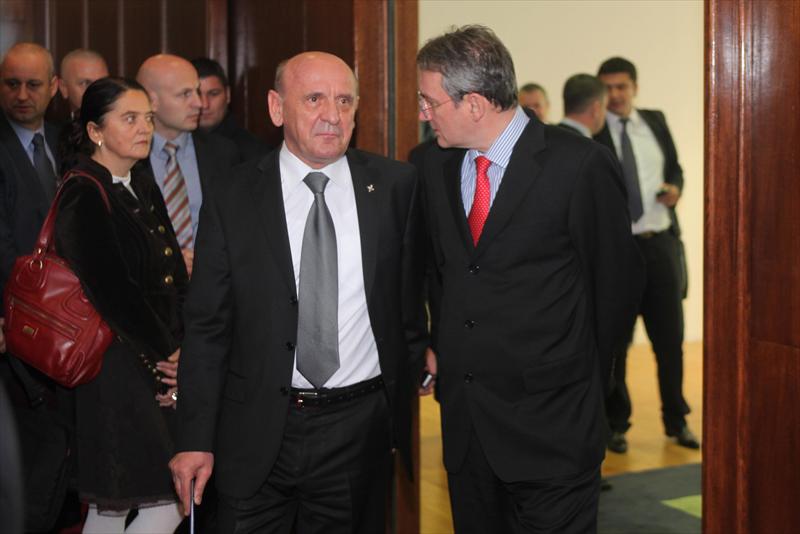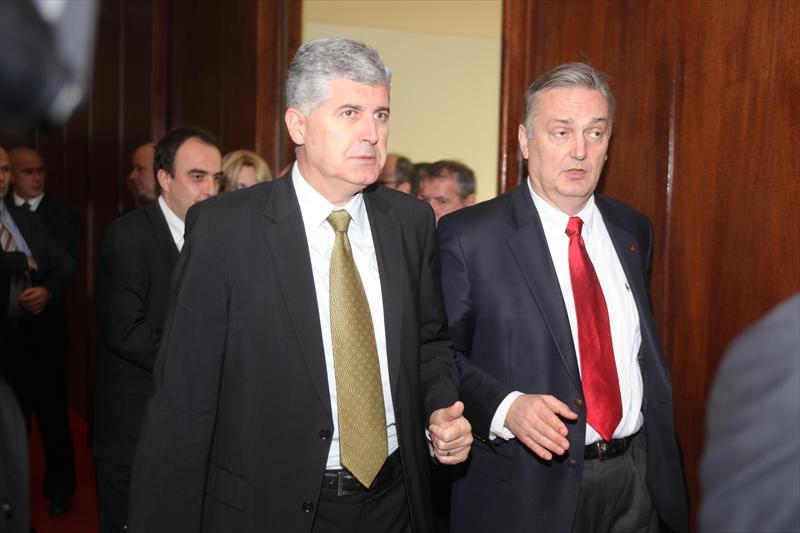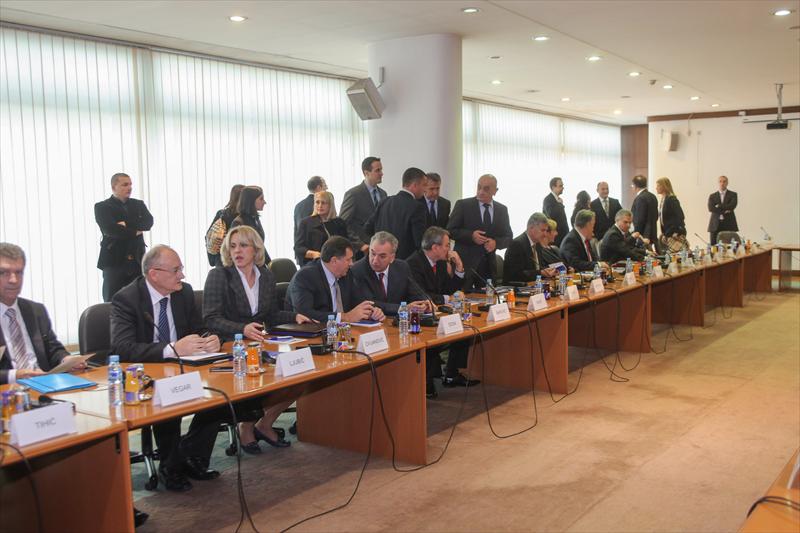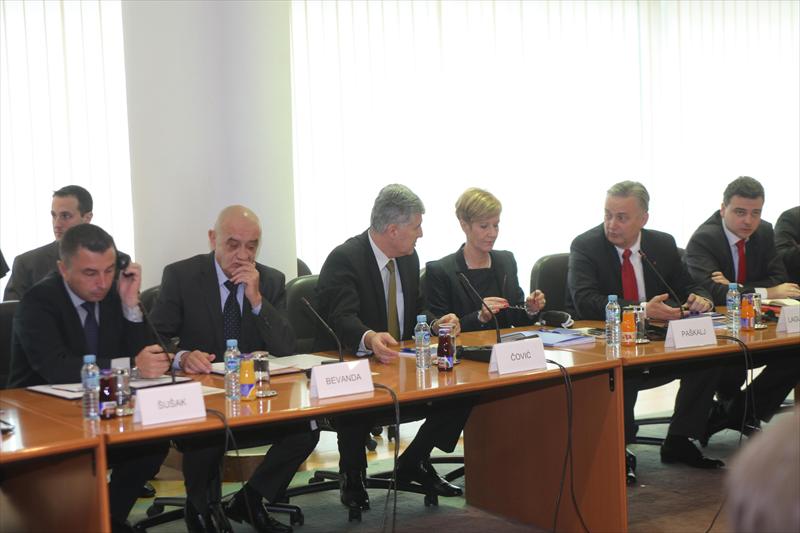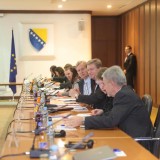Check against delivery
2nd meeting of the High-level Dialogue on the Accession Process
Sarajevo, 27 November 2012
Presidents, Your Excellencies, Dear Colleagues,
It is a pleasure to be here in Sarajevo for the 2nd meeting of the High-Level Dialogue on the Accession Process between the European Union and Bosnia and Herzegovina. The High Level Dialogue remains an important tool for furthering the European Union agenda, despite the initial delays on meeting the agreed timelines. I am eager to hear from you what has been done and how you intend to meet the milestones.
In June, I had hoped that the Stabilisation and Association Agreement could be in force before our second meeting of the High Level Dialogue; and that there could be a credible application for European Union membership still this year. Now, five months later, I regret that the first timeline on compliance with Sejdić-Finci ruling, which was 31 August, could not be met. But I note that initial steps were taken to meet some of the requirements of the European Union Roadmap. By the agreed timeline of 31 October, answers to the list of sectoral questions on public procurement and on the environment were prepared and a working group on the coordination mechanism agreed to general principles for European Union coordination. They go in the right direction but they are not enough for real progress! Later on I will provide comments on the methodology of your replies.
Let me start by making three remarks about the horizontal challenges identified in this year’s Enlargement Strategy and how these challenges should be tackled urgently in Bosnia and Herzegovina:
First, regarding the rule of law, during the accession process many changes will be needed in your legal, economic and social system to make it compliant with European Union requirements. The Structured Dialogue on Justice has given you a first insight of the European Union methodology. And the ongoing dialogue since 2008, in the framework of the Stabilisation and Association Process, has continued to work as a consensus building platform. It is now crucial that all competent actors contribute to the revision of the High Judicial and Prosecutorial Council Law, as well as with the adoption of a Law on the Courts of Bosnia and Herzegovina that would reform the state level judiciary through strengthening the current institutional setting and also clarifying prerogatives vis-à-vis other instances. Some deliverables are also more directly in the hands of the Entities’ governments. Among others, we rely on the RS government to complete the alignment of the Law on the Courts of RS.
Second, regarding regional cooperation and reconciliation in the Western Balkans, the past year has seen major progress by a number of Western Balkan countries on their path towards the European Union. Croatia is on track to becoming the 28th Member of the European Union on 1 July 2013; accession negotiations have started with Montenegro; Serbia has been granted Candidate Status; Albania is making good progress and even Kosovo1 is taking strides on its European path. Regrettably, the same cannot be said about Bosnia and Herzegovina. I regret that the whole region is moving ahead towards the European Union but that Bosnia and Herzegovina is lagging behind.
Without proper coordination, the implementation of the Roadmap allowing Bosnia and Herzegovina to continue exporting agricultural products of animal origin (such as milk, meat, poultry and eggs) to Croatia and the rest of the European Union will be delayed. This will result in serious economic losses for your exporters. Bosnia and Herzegovina has just as much potential as any of its neighbours. For several years, we have provided expertise and warned that serious preparations ahead of Croatia’s accession were needed but to no avail.
I have held a trilateral meeting in Brussels in September and another one is planned for December. In between, several technical meetings were held. It is now key to get a reaction to the interpretative note.
Third, regarding economic and social challenges, the difficulties in the Eurozone and the global financial crisis have shown how interdependent national economies are inside the European Union and beyond. In Bosnia and Herzegovina, it is high time that concrete action is taken to address pressing socio-economic issues so that your most vulnerable citizens can also be covered by social safety nets. It is unfortunate that associations of disabled citizens have to come to Brussels to get their voice heard!
A functioning electricity transmission system is of high importance for the integration of Bosnia and Herzegovina’s electricity market in the energy market of South-East Europe and the internal market of the European Union. The countrywide electricity transmission company TRANSCO is finally being made operational but the planned investments have to take place. This will facilitate foreign investments in a key sector of your economy.
Ladies and gentlemen,
There were also some positive signs at the start of 2012 when the newly elected Chair of the Council of Ministers, Mr Bevanda, declared that “2012 will be the Year for Europe in Bosnia and Herzegovina”. But, the subsequent breakdown of political consensus meant that the main timeline in the European Union Roadmap agreed by representatives of the main political parties at the June High Level Dialogue has not been met.
What is the European Union asking for? Let me be clear: what the European Union Roadmap agreed last June remains valid. The tasks will not change:
For the entry into force of the Stabilisation and Association Agreement, a proposal, based on political agreement, needs to be submitted to the Parliamentary Assembly to amend the Constitution for compliance with the Sejdic Finci ruling;
For a credible membership application, the Parliamentary Assembly needs to adopt the amendments to the Constitution, as a result of a consensus building process. Moreover, a satisfactory track record in implementing obligations under the Interim Agreement is a key element for a credible membership application to be considered by the EU.
Above all, establishing coordination mechanisms for engagement with the European Union and for the effective use of pre-accession assistance remains a key priority. Following a membership application, when the challenging period of the accession process starts, functional institutions are needed for progress on the European Union path. But even today, effective coordination between all levels of authorities is needed for European Union matters, for an effective use of the European Union pre-accession assistance and for meeting obligations from the Interim Agreement. Let us not forget that the Interim Agreement’s trade provisions are to be respected in a spirit of reciprocity and not protectionism.
The Pilot Census just completed demonstrated that coordination between the State-level and entities requires strengthening. Full cooperation between the 3 Statistical offices is a requirement under the Census Law itself. Therefore, efficient coordination is also needed to get a true statistical picture from the Population Census [to be held in spring 2013] – which in turn is needed for socio-economic development purposes.
To conclude, the Roadmap remains possible to fulfil: the entry into force of the Stabilisation and Association Agreement and the submission of a credible membership application remain realistic prospects provided there is sufficient political will to reach consensus and to realise the European Union aspirations of your citizens through concrete actions.
The European Union will continue to support Bosnia and Herzegovina on its path towards European Union membership with expertise and financial support and through its reinforced presence on the ground. But the country’s political representatives have to play their part by firmly anchoring the European Union agenda at the heart of the political process and translating it into concrete action. Therefore I expect to hear from the leaders gathered here today on how and when the Road Map tasks will be completed. This is the way to move the European Union agenda forward. The doors of the European Union are open to Bosnia and Herzegovina but it is for you, as the main political representatives, to decide how quickly the country will go through these doors. The time to move the European Union agenda forward in Bosnia and Herzegovina is now.
Thank you.




